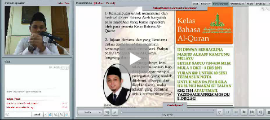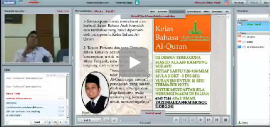Kelas Bahasa Al-Quran Module 2 Session 2
بسم الله الرحمن الرحيم BismillahirRahmanirRahim This Week’s High Frequency Word of The Noble Quran Week – 2 ’12 Session 2 High Frequency Word of the Noble Quran 1″َأَيْنَ”3 “تِلْكَ”2 “ذَلِك” ===================================================== 1 – َذًلِك / “zalika” means “that” [for male] Example from the Quran: “ِذَلِكَ الكِتَابُ لاَ رَيْبَ فِيْه “ Transliteration: ” zalika al-kitabu […]
Kelas Bahasa Al-Quran Module 2 Session 1
بسم الله الرحمن الرحيم BismillahirRahmanirRahim This Week’s High Frequency Word of The Noble Quran Week – 1 ’12 Session 1 High Frequency Word of the Noble Quran 1″كَيْفَ”3 “هَذِهِ”2 “هَذَا” ===================================================== 1 – هَذَا / “haza” means “this” [for male] Example from the Quran: “قَالَ هَذَا مِنْ فَضْلِ رَبِّي” Transliteration: “‘qala haza min fadli rabbi” English Translation: […]
2nd Last Session of “Kelas Bahasa Al-Quran”

BismillahirRahimanirRahim In the last session of “Kelas Bahasa Al-Quran”, Language of the Quran Class, a class dedicated towards the understanding of the meaning of the meaning of the Noble Quran straight form the Book, we did a comprehensive revision of the the grammatical concepts we’ve learned in this module. Such as the concept […]
Massive Memorization of the Noble Quran

At 5:00 PM an effective, ground-breaking technique of memorizing the Quran will be shared at Masjid Alkaff Kg Melayu. At 7:30 PM on the first day of 1433 Hijriyah, all attendee will be able to practice this technique, and will make a Mass Memorization of the Noble Quran, at one time! What is this […]
